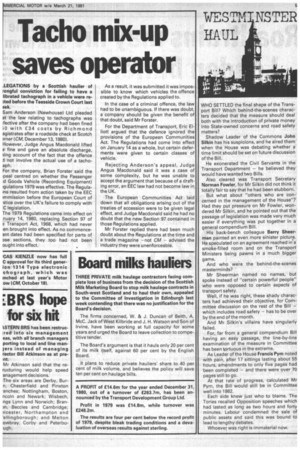Tacho mix-up saves operator
Page 7

If you've noticed an error in this article please click here to report it so we can fix it.
.LEGATIONS by a Scottish haulier of rongful conviction for failing to have a librated tachograph in a vehicle were re:ted before the Teesside Crown Court last aek.
Sam Anderson (Newhouse) Ltd pleaded at the law relating to tachographs was ifective after the company had been fined 30 with £34 costs by Richmond agistrates after a roadside check at Scotch arner (CM, December 13,19801.
However, Judge Angus Macdonald lifted e fine and gave an absolute discharge, (ing account of the fact that the offence I not involve the actual use of a tachoaph.
For the company, Brian Forster said the Ipeal centred on whether the Passenger d Goods Vehicle (Recording Equipment) !gulations 1979 was effective. The Reguiains resulted from action taken by the EEC 3mmission before the European Court of slice over the UK's failure to comply with :C legislation.
The 1979 Regulations came into effect on nuary 14, 1980, replacing Section 97 of a Transport Act, 1968, which had never en brought into effect. As no commenceant dates had been specified for parts of bse sections, they too had not been ought into effect. As a result, it was submitted it was impossible to know which vehicles the offence created by the Regulations applied to.
In the case of a criminal offence, the law had to be unambiguous. If there was doubt, a company should be given the benefit of that doubt, said Mr Forster.
For the Department of Transport, Eric Elliott argued that the defence ignored the provisions of the European Communities Act. The Regulations had come into effect on January 14 as a whole, but certain deferments were given to certain classes of vehicle.
Rejecting Anderson's appeal, Judge Angus Macdonald said it was a case of some complexity, but he was unable to accept the argument that because of a drafting error, an EEC law had not become law in the UK.
The European Communities Act laid down that all obligations arising out of the treaties of accession were to be given legal effect, and Judge Macdonald said he had no doubt that the new Section 97 contained in those Regulations applied.
Mr Forster replied there had been much doubt about the Regulations at the time and a trade magazine —not CM — advised the industry they were unenforceable.












































































































